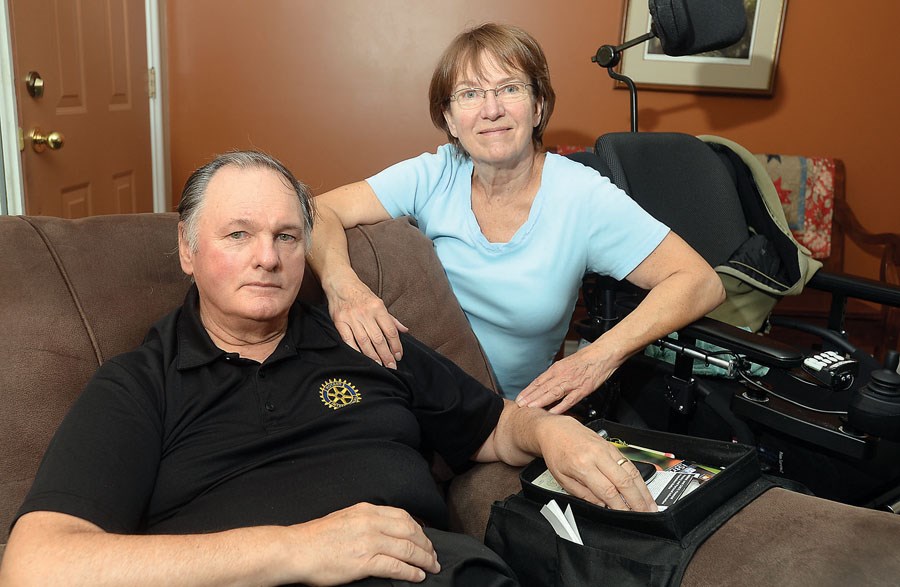Although diagnosed in 2010, Gary Gurnsey didn't exhibit the classic symptoms of Parkinson's disease.
"He just didn't fit the symptoms so we tried a lot of outside things like naturopaths, different doctors, chiropractors and message therapists - you name it, " said Betty Gurnsey, Gary's wife. "Quite a lot of them said his symptoms were not typical Parkinson's."
Parkinson's disease is the second most common chronic neurodegenerative disorder after Alzheimer's. Movement is normally controlled by dopamine, a chemical that carries signals between the nerves in the brain. When cells that normally produce dopamine die, Parkinson's symptoms appear, such as tremors, slowness and stiffness, impaired balance, rigidity of muscles, fatigue, soft speech, stooped posture, and problems with handwriting. Medication can treat some symptoms but there is no cure.
"Gary was diagnosed with Progressive Supranuclear Palsy, but that didn't quite fit the bill at the time either, but as the years progressed and Gary's symptoms got rapidly worse, we started to go to the Parkinson's support group meetings and we found that to be tremendously helpful."
People in the support group might not have the classic symptoms of Parkinson's but rather what is known as Parkinsonisms. And that's where Gary fits in.
"After going to a neurologist in Prince George [earlier this year] and reading up on Progressive Supranuclear Palsy, many of the symptoms fit Gary very well," said Betty. "Unfortunately, it's fairly rare so there is no medical research being funded towards it, so there is absolutely no drug that can help with Gary's symptoms."
Gary, 71, walks with the aid of walking poles that help keep him stable.
"His mobility has disintegrated tremendously, and now he has great difficulty even getting from one chair to another," said Betty. "Getting out of the house is a whole new ball of wax. Now not only is his mobility affected but also his speech, and his eyesight is deteriorating. Our goal is to keep Gary at home for as long as possible."
Plans have changed for the couple, who had purchased an acreage just outside of the city, where they intended to spend their retirement years. Now they live in a renovated city home, suitable for Gary's needs, Betty said.
"The things Gary enjoyed and was so active in, unfortunately he had to give up," said Betty.
Gary is a founding member of the Nechako Rotary Club, which started 29 years ago.
He is well known for his passion for projects like Operation Red Nose, which offers safe rides home for people and their vehicles during the holiday season and Shelter Boxes, that were sent to far off lands after disaster struck.
Gary is a founding director of Helicopter Emergency Rescue Operations Society (HEROS) in northern B.C. and remains on the board as a director. He has been heavily involved in the Tse'khene Community Development Corporation of the McLeod Lake Indian Band.
"Gary has always been an active member at our church [Westwood Mennonite Brethren Church] but again I think the mobility - but almost more than the mobility, because I can get him places, but the inability to speak is an issue."
Gary lost his full voice about a month ago, which is now reduced to a wispy whisper, as he describes it.
Betty said she couldn't imagine the frustration Gary feels when he can't be heard.
"We realize this is a progressively deteriorating condition and I'm going to be facing all kinds of different things," said Gary hoarsely. It took Gary six months to recover from a pulled muscle in his arm and he has pain in his ankles and his knees on a regular basis.
"The biggest problem I have is the frustration of not being able to move around and do things that I normally do," said Gary. "I have always been a pretty active person and I was always involved." His job before he retired was with the Ministry of Forests as assistant regional manager in finance and administration.
Gary and Betty have three sons and a daughter, and with them comes 12 grandchildren that bring a lot of joy to the couple.
"Very rarely will a day go by without a visit from family," said Betty.
Using the HandyDART, Gary goes to the Rainbow Day Centre a few days a week, which Betty said gives him a change of scenery.
"This also gives me the ability to get out and about and do what I need to do," said Betty.
Gary is currently busy with an advocacy committee for the Parkinson Society British Columbia support group in Prince George.
"I'm working towards a number of things to help the community become more aware of Parkinson's and we've done a number of presentations throughout the community," said Gary, his voice fading quickly. Betty knows that's her cue to pick up where Gary left off.
"We've gone in and spoken to nursing students, to the neurological doctors in training, and at the Geriatric Assessment and Treatment Unit at the hospital," Betty added.
In B.C. about 11,000 people live with Parkinson's and there is more than 100,000 who have it in Canada.
The Parkinson's Super Walk takes place in Prince George this Saturday at the Fort George Park picnic shelter. Registration is at noon and the walk starts at 12:30. The walk celebrates every day heroes who inspire hope. The SuperWalk is the biggest fundraising event for Parkinson Society Canada and each year about 14,000 people across Canada participate. In total across the nation $2.76 million was raised last year and since 2000, $27 million was raised for support services, research, advocacy and education.



